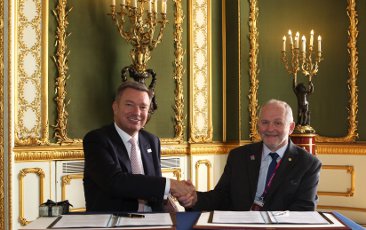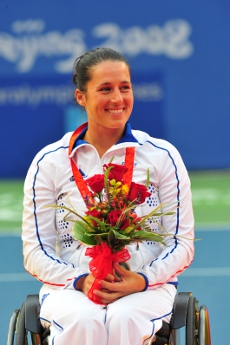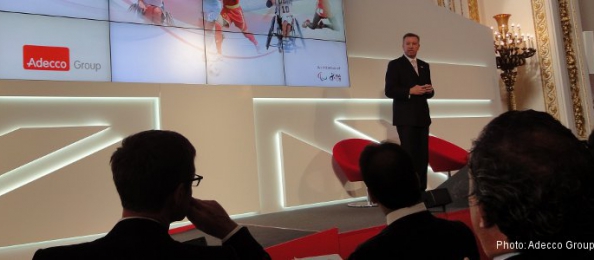The Future of Work: Superhumans Included
The British broadcaster of the 2012 Paralympic Games invited viewers to “meet the superhumans.” More than an advertising phrase to highlight Paralympians’ sporting ability, it also opened minds to the unique talents and potentials of people with disabilities – or rather, with different abilities. As the world’s leading provider of HR services, we are passionate about this ethos. Adecco helped recruit the people to work at the most inclusive Olympic and Paralympic Games ever.
With around 32,000 employees assisting 700,000 associates on a daily basis, we embrace our responsibility to uphold the UN Global Compact Principle 6: “The elimination of discrimination in respect of employment and occupation.” In 2012, our activities in this field intensified as we helped recruit the people to work at the Olympic and Paralympic Games. Our approach is about doing a wide range of ordinary things for extraordinary people, for the good of the economy and society. “Better work, better life” applies to everyone and the future of work means “superhumans included.”
As the official recruitment services provider to the London Olympic and Paralympic Games, Adecco UK & Ireland helped the London Organising Committee of the Olympic Games (LOCOG) realize their vision to create the most inclusive Games ever. Lord Sebastian Coe, Chair of LOCOG, says, “Inclusion is about removing barriers to making people participate at every level.” Embracing this philosophy, we partnered with LOCOG to manage 218,000 applications and hire 8,300 people to work directly for LOGOC, being the people behind the Games. Thanks to our Diversity Tracking Software, we knew that 10 percent of the registered workforce had some kind of disability, which was way beyond our 6 percent target from LOGOC.
London 2012 – The most inclusive Games
| Initiator | Adecco Group |
| Project start | 2007 |
| Status | ongoing |
| Region | Worldwide |
| Contact person | Lilian Furrer |
| Awards | - |
Project benefit
- HR-Management
- Inclusion of disabled people
| Anti-Corruption | - |
| Business & Peace | - |
| Development | - |
| Environment | - |
| Financial Markets | - |
| Implementing UNGC Principles in your Corporate CSR Management | - |
| Human Rights | X |
| Labour Standards | X |
| Local Networks | - |
| Advocacy of global issues | X |
| Business opportunities in low income communities/countries | - |
| Project funding | - |
| Provision of goods | - |
| Provision of services/personal | X |
| Standards and guidelines development | - |
- London Organising Committee of the Olympic Games (LOCOG)
- International Paralympic Committee (IPC)
A Guaranteed Interview Scheme and the Disability Talent Pool were vital for this achievement. The Guaranteed Interview Scheme meant that if a disabled candidate’s curriculum vitae demonstrated that he or she had the required skills and experience for the role applied for, Adecco guaranteed them an interview and the opportunity to display their skills. The Disabled Talent Pool was created by Adecco and used by LOCOG’s Diversity and Inclusion Team. It gave disabled people who initially missed out on a position the possibility to be considered for other opportunities. Adrian Cross, COO Hyphen, Adecco Group UK & Ireland says, “Our diversity deliverables demonstrate what can be achieved when the right stakeholder cooperation – supported by robust systems and processes – are implemented. The fact that Adecco and LOCOG jointly worked to deliver and overachieve on the key elements of the government’s diversity targets is widely recognized as ground-breaking.”

Photo: Acecco Grpup
The IPC Academy Inclusion Summit
To support one of the goals of the Paralympic Games, which is to promote inclusion in our wider society, Adecco joined forces with the International Paralympic Committee (IPC) to organize the IPC Academy Inclusion Summit, which took place between September 6 and 8, 2012, in London. Speakers included Organising Committee of the Olympic and Paralympic Games (OCOG) representatives, companies such as Adecco and British Airways, as well as Paralympic athletes sharing their view on what the benefits of inclusive and accessible societies are by exemplifying the Paralympic Games as a catalyst for societal change. Attendees included more than 100 people from around the world representing governments, disabled people’s organizations, businesses, and the International Labour Organization. In his opening speech, IPC President, Sir Philip Craven, set the stage with a clear message: “London 2012 is a continuous legacy. We must drop the word disabled and make ability and accessibility the main topics.”
Adecco Group CEO, Patrick De Maeseneire, highlighted both the economic and social case for a diverse workforce, stating that the inclusion of people with different backgrounds and abilities into the working world is high on Adecco’s agenda: “Inclusion because we need it; inclusion because we want it.” He drew attention to a growing scarcity of workers and skills that makes inclusiveness essential and highlighted a study by the Centre for Strategy & Evaluation Services, which showed that more than 60 percent of companies with diversity policies reported that it strengthened cultural values, enhanced corporate reputations, and helped them attract and retain highly talented people. More than 50 percent of companies stated that diversity contributed toward improved innovation and creativity among employees, enhanced service levels and customer satisfaction, and helped overcome labor shortages. De Maeseneire concluded: “As the leader in inclusive workforce, it is our responsibility to create opportunities and offer solutions for individual development. It not only enhances social harmony but has tangible economic value at a time when the skills shortage is growing.”

Photo: Adecco Group
Multifaceted action for inclusion
As a Steering Committee Member of the ILO Global Business and Disability Network, our activities aimed at the inclusion of disabled people are multifaceted. Through working with disability organizations and government employment services, we helped more than 50,000 disabled people integrate into the labor market between 2007 and 2012.
In 2012 the IPC and Adecco extended their relationship to deliver the IPC Athlete Career Programme for the next eight years. The cooperation began in 2007 by helping Paralympians with career guidance and employment to sustain an income while competing for a successful transition into the workforce. So far, the Programme has been adopted by 15 National Paralympic Committees, with another 5 to 10 countries joining in 2013. Dervis Konwalp, a British Paralympian swimmer and multiple medalist, states: “The Programme allows us to see our own skills and realize the traceability from our sporting careers to our working careers.”
At Adecco we strongly believe in the power of sport to engage and unite people behind a common cause. Each year, our Win4Youth program galvanizes thousands of Adecco Group colleagues, clients, and now also associates, to take part in joint sporting activities to collect kilometers and raise funds for organizations that have a clear focus on giving young people a future in work and life. In 2012 and 2013, we asked elite athletes to champion the Win4Youth project. The Godfather of the 2012 program was Belgian disabled triathlete and role model, Marc Herremans. In 2013, supporting our Win4Youth efforts is medal-winning Paralympian, Wheelchair Tennis player, and “One of Us,” Florence Gravellier. Since 2010 she has been leading the Disability and Skills Programme for Adecco France. As a role model for the power and potential of inclusion, Gravellier says: “People do not define me as a former athlete or Paralympian anymore. I have become part of the mainstream workforce. This is what inclusion is all about, being accepted and playing a part.”
This project description was originally presented in the Global Compact International Yearbook 2013.
Lilian Furrer works for the company Adecco where she also takes care for CSR related issues.
Write a comment about this page
Your comments are provided by your own free will and you take sole responsibility for any direct or indirect liability. In order to maintain the highest discussion quality, all comments will be reviewed by our editors. You hereby provide us with an irrevocable, unlimited, and global license for no consideration to use, reuse, delete or publish comments in accordance with our Community Guidelines.
About Us // Privacy Policy // Copyright Information // Legal Disclaimer // Contact
Copyright © 2012-2018 macondo publishing GmbH. All rights reserved.
The CSR Academy is an independent learning platform of the macondo publishing group.









